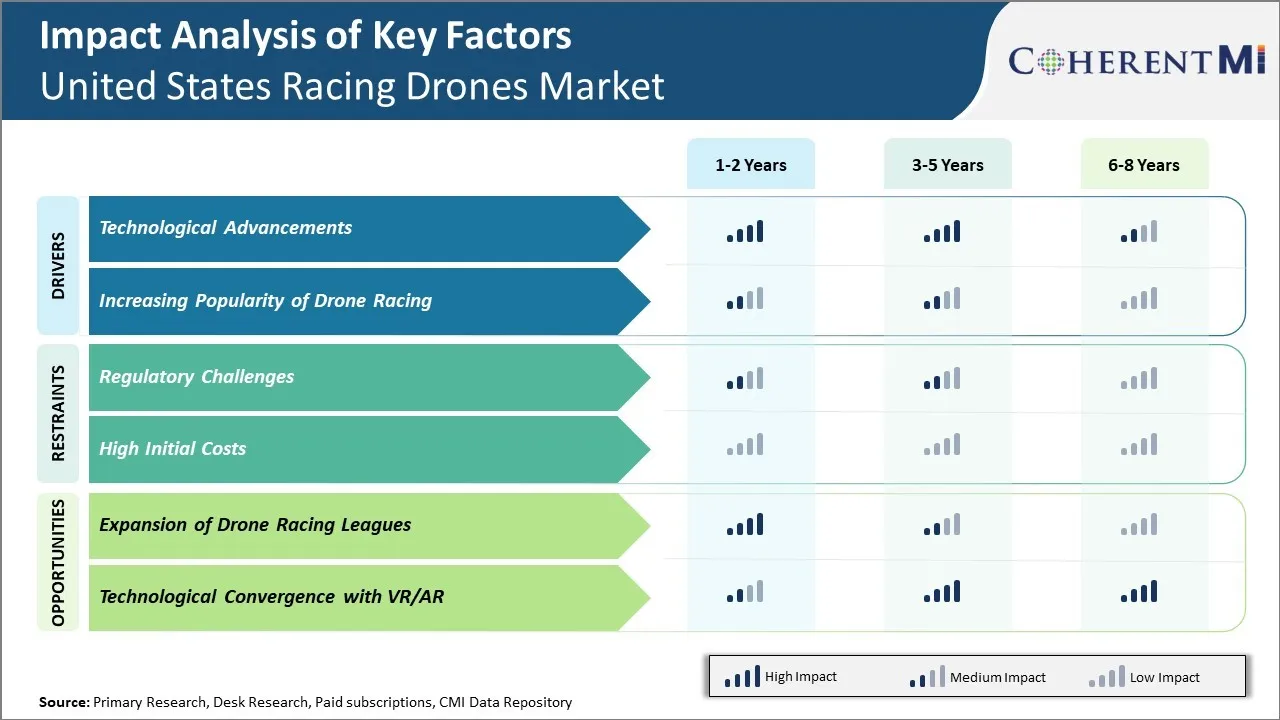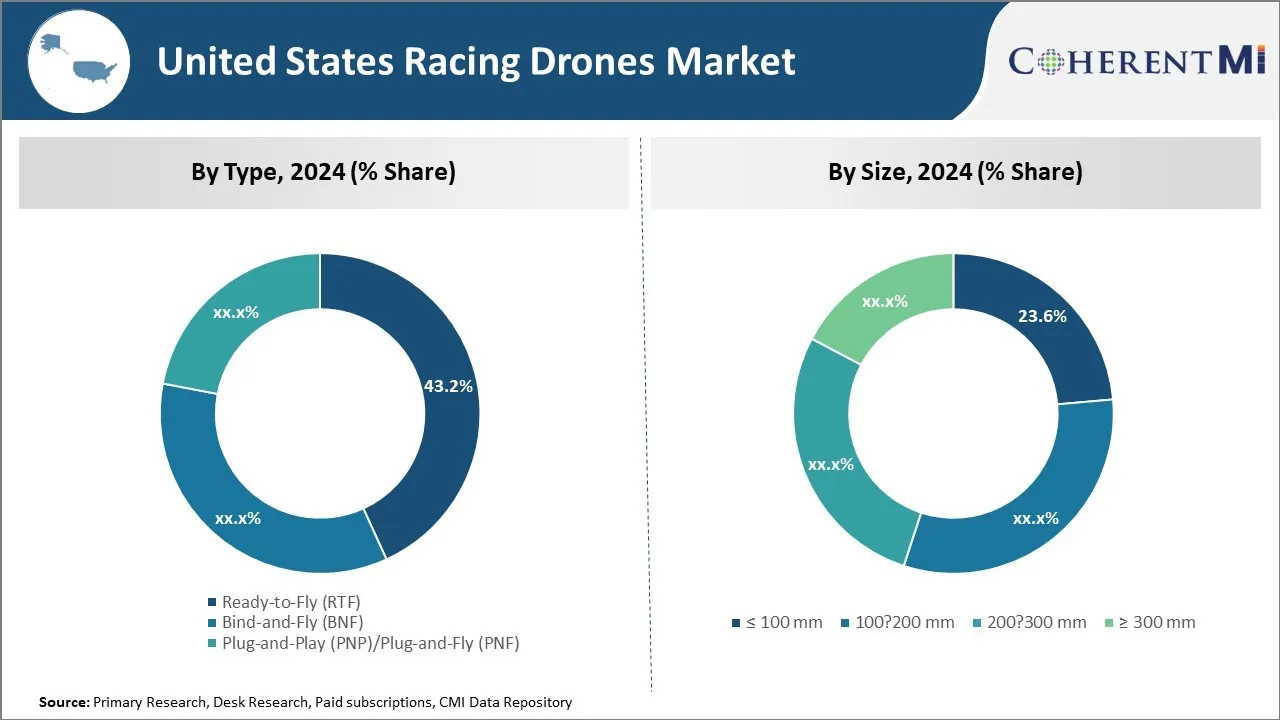United States Racing Drones Market SIZE AND SHARE ANALYSIS - GROWTH TRENDS AND FORECASTS (2024 - 2031)
United States Racing Drones Market is Segmented By Type (Ready-to-Fly (RTF), Bind-and-Fly (BNF), Plug-and-Play (PNP)/Plug-and-Fly (PNF), By Size ( ≤ 1....
United States Racing Drones Market Size
Market Size in USD Mn
CAGR18.1%
| Study Period | 2024 - 2031 |
| Base Year of Estimation | 2023 |
| CAGR | 18.1% |
| Market Concentration | High |
| Major Players | Armattan Productions, Rotor Riot, GEPRC, Holybro, TBS (Team BlackSheep) and Among Others. |
please let us know !
United States Racing Drones Market Analysis
The United States Racing Drones Market is estimated to be valued at USD 353.01 Mn in 2024 and is expected to reach USD 1,333.19 Mn by 2031, growing at a CAGR of 18.1% from 2024 to 2031.
Factors such as increasing popularity of drone racing as a sport, enhanced drone features with advanced technologies, and rising discretionary spending on hobbyist drones have been driving the market.
United States Racing Drones Market Trends
Market Driver – Technological Advancements
Technological advancements are significantly driving the growth of United States Racing Drones Market. With rapid developments in aerial photography, artificial intelligence and data processing capabilities, racing drones are becoming more autonomous, intelligent and programmable. Manufacturers are equipping drones with advanced cameras, sensors, algorithms and computer vision technologies which enable drones to sense obstacles, track objects and navigate autonomously with minimal human intervention. This has opened new possibilities for commercial, agricultural, defense and leisure applications of racing drones.
Racing drones are being made lighter, more durable and capable of achieving greater speeds due to continuous innovation in materials, propulsion systems and aerodynamic designs. Carbon fiber and polymers are increasingly replacing metals to build lightweight yet robust drone structures. Brushless electric motors provide powerful thrust while minimizing weight. Multi-rotor configurations and collapsible designs make drones compact for portability. Advanced flight controllers, powered by the latest microprocessors, smoothly coordinate the flight of multiple rotors for precise maneuvers. Robust and customizable batteries with higher energy density are delivering longer flight times to pilots.
Market Driver – Increasing Popularity of Drone Racing
The popularity of drone racing has been steadily increasing in the United States over the past few years. Drone racing involves piloting small racing drones through obstacle courses at high speeds through first-person view goggles. It has grown to become a legitimate sport, with competitions and leagues forming across the country. This rising interest in drone racing as a recreational activity has led to strong growth in the market for racing drones in the US.
As more people get involved in drone racing as pilots, spectators and enthusiasts, the demand for specialized racing drones has increased considerably. Racing drones need to be extremely lightweight, agile and fast in order to maneuver nimbly through complex racing tracks. They often have carbon fiber frames, powerful brushless motors and custom-built controllers that give pilots accurate control. With the proliferation of drone racing clubs and competitions, manufacturers are investing heavily in developing new models every season with upgraded features to aid in racing. Major brands like DJI and Holy Stone have expanded their portfolio of racing drones tailored for indoor and outdoor courses at different skill levels.

Market Challenge – Regulatory Challenges
Regulatory challenges are significantly restraining the growth of United States Racing Drones Market. Similar to other innovative technologies, racing drones also face strict regulations around their usage due to concerns around safety and national security. Various federal and state governing bodies have imposed limitations on flying drones in restricted areas and above certain height. The Federal Aviation Administration (FAA) requires all commercial and hobbyist drones to be registered and has established 'no-fly zones' around airports and other sensitive locations. Moreover, drones are banned from flying over 400 feet, flying over people, and flying at night without waivers.
Complying with regulations involves additional costs and paperwork for drone manufacturers, retailers as well as end-users. The compliance burden discourages exploration of drone technology for commercial activities and deters recreational flyers. Many potential applications of racing drones such as delivery services, infrastructure inspection, and aerial photography are not realized due to regulatory barriers. Even grassroots drone racing events struggle to obtain necessary waivers for flying activities. The lack of a clear nationwide regulatory framework creates confusion among stakeholders and slows down technology advancement.
Market Opportunity – Expansion of Drone Racing Leagues
The expansion of drone racing leagues in the United States presents a great opportunity for growth in the domestic racing drone market. Over the past few years, drone racing has emerged as a new and thrilling spectator sport. Popularized firstly by YouTube videos and live streaming broadcasts, drone racing leagues have officially organized competitions with standardized rules and equipment requirements across North America. This professionalization of the sport has created demand for specialized high-performance racing drones that can withstand high-speed maneuvers and crashes.
As drone racing leagues continue promoting the sport and drawing new audiences, particularly younger demographics, the market for racing drones catered towards hobbyists and amateur pilots will likely expand substantially. Major tech and drone manufacturers are poised to capitalize on this opportunity by developing more durable yet affordable drone models optimized for racing. Customization options allowing pilots to express their skills and styles will further encourage spending within the market. Drone racing is also uniquely positioned to capture the imagination of young people interested in STEM and inspire more to consider careers in fields like engineering, coding and electronics.
Segmental Analysis of United States Racing Drones Market
Insights, By Type: Convenience and Accessibility Drive Demand for Ready to Fly Drones
Within the US racing drone market segmented by type, ready-to-fly drones contribute the highest share of 43.2%owing to their convenience and accessibility. These drones are pre-built and pre-programmed, requiring no assembly or setup from buyers. This ease of use allows hobbyists and recreational flyers to enjoy racing drones without extensive technical knowledge or patience for assembly.
Their plug-and-play nature lowers the barrier to entry into the exciting world of racing drones. Beginners need not worry about selecting components, soldering parts, or debugging hardware/software issues that can arise during assembly. They can spend more time focusing on flying skills instead of production hassles. The convenience also appeals to occasional recreational fliers who want to experience racing drones without a major time commitment to building their own aircraft.
From a business perspective, ready-to-fly drones maximize sales opportunities in the general consumer market. Their accessibility means even niche retail stores without drone expertise can stock these models on their shelves. Casual customers browsing the aisles are more likely to impulse-buy a racing drone they can use immediately rather than invest time and effort into an assembled option. Manufacturers also benefit from standardized production enabling higher volumes and economies of scale compared to customized built-to-order models.

Insights, By Size: Agility and Portability Fuel Demand for 100-200mm Drones
Within the size segment of the US racing drone market, the 100-200mm category holds the largest share of 31.42%. Drones in this range offer an ideal balance of agility and portability that appeals strongly to both amateur and advanced pilots.
Their compact 100-200mm chassis allow for nimble maneuvering through tight courses at high speeds during races. Pilots can execute split-second direction changes and hairpin turns that aren't possible with larger, bulkier models. This premium performance gives racers a competitive edge and heightens the thrill of competition.
At the same time, the smaller footprint of 100-200mm drones makes them highly transportable. Racers can easily fit several in a standard travel case for events away from home. Their lighter weight also means these models can often be flown indoors or in smaller outdoor areas when weather prevents outdoor racing. Compact portability opens more opportunities for pilots to practice and compete versus bigger drones that are less practical to transport frequently.
For non-racing hobbyist use, the modest 100-200mm size strikes a good balance of maneuverability for recreational flying without overwhelming casual users with too large an aircraft. New pilots feel more comfortable learning skills with a smaller drone.
Competitive overview of United States Racing Drones Market
The major players operating in the United States Racing Drones Market include Armattan Productions, Rotor Riot, GEPRC, Holybro, TBS (Team BlackSheep), iFlight, BetaFPV, CadX Racing, Emrax (Manufacture Motors), and Brotherhobby (Manufacture Motors).
United States Racing Drones Market Leaders
- Armattan Productions
- Rotor Riot
- GEPRC
- Holybro
- TBS (Team BlackSheep)
United States Racing Drones Market - Competitive Rivalry, 2024

United States Racing Drones Market
(Dominated by major players)
(Highly competitive with lots of players.)
Recent Developments in United States Racing Drones Market
- On March 20, 2024, the Drone Racing League (DRL), known as a top professional drone racing organization worldwide, introduced ‘DRL's Women Taking Flight’. This program aims to empower women in sports, technology, and aviation. The U.S. Air Force, a longstanding partner of DRL, joined as a founding supporter. The initiative will feature drone racing competitions, esports tournaments, and STEM education to attract talented women drone pilots for DRL and the U.S. Air Force, promoting gender diversity in traditionally male-dominated fields.
- In August 2021, T-Mobile, a leader in 5G technology in the U.S., partnered with The Drone Racing League (DRL) to advance 5G-powered drone technology. They launched the first 5G-enabled racing drone globally, equipped with a built-in 5G module for live streaming high-definition First Person View (FPV) race footage directly to the internet. This collaboration aims to enhance viewer engagement by bringing fans closer to the racing action through T-Mobile’s extensive 5G network.
United States Racing Drones Market Segmentation
- By Type
- Ready-to-Fly (RTF)
- Bind-and-Fly (BNF)
- Plug-and-Play (PNP)/Plug-and-Fly (PNF)
- By Size
- ≤ 100 mm
- 100–200 mm
- 200–300 mm
- ≥ 300 mm
- By Component
- FPV Goggles
- FPV Remote Controllers
- Cameras
- Batteries
- Motors
- ECSs (Electronic Speed Controllers)
- Flight Controllers
- Others
- By Application
- Rotorcross
- Drag Racing
- Time Trial

Would you like to explore the option of buying individual sections of this report?
Frequently Asked Questions :
What are the key factors hampering the growth of the United States Racing Drones Market?
The regulatory challenges and high initial costs are the major factors hampering the growth of the United States Racing Drones Market.
What are the major factors driving the United States Racing Drones Market growth?
The technological advancements and increasing popularity of drone racing are the major factors driving the United States Racing Drones Market.
Which is the leading Type in the United States Racing Drones Market?
The leading Type segment is Ready-to-Fly (RTF).
Which are the major players operating in the United States Racing Drones Market?
Armattan Productions, Rotor Riot, GEPRC, Holybro, TBS (Team BlackSheep), iFlight, BetaFPV, CadX Racing, Emrax (Manufacture Motors), and Brotherhobby (Manufacture Motors) are the major players.
What will be the CAGR of the United States Racing Drones Market?
The CAGR of the United States Racing Drones Market is projected to be 18.1% from 2024-2031.